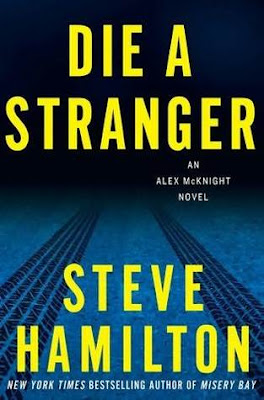Hamilton's investigator, Alex McKnight (featured in eleven books), lives in Michigan's Upper Peninsula, a region defined by the bush, the Great Lakes, and Native American reservations. I've lived and worked in northern Canada, and Hamilton gets the atmosphere of this environment perfectly; in particular, he gives the reader a feel for the divide, and occasional tension, between Natives and the white community. As well, he captures the necessary interconnectedness of the people who live in these isolated, underpopulated areas, bound together by blood ties, friendship, and sometimes long-held grudges. It's a peculiar world that's largely the same on both sides of the border, and Hamilton clearly knows it well.
In Die a Stranger McKnight becomes caught up in a cross-border drug smuggling operation that goes wrong and which also drags in one of his close friends. The plot mixes mystery and thriller elements, but it also takes time to build up a picture of life in the Upper Peninsula. I'd read several thrillers in a row prior to Stranger, so there was something pleasing about a story that wasn't trying to slap me across the face every second. I've no objection to pure thrillers, but they can become formulaic and predictable when you know that every chapter is going to end with some kind of twist or shock reveal. A crime novel such as this can actually be more surprising because it digresses, taking quick side trips to places that are new or foreign to us, e.g. a look at the impact of Native-owned casinos on reservation life. And Hamilton puts equal emphasis on the personal relationships that bind his characters and often direct their actions. The finale, in fact, avoids the usual violent, climactic encounter or arrest, and instead has a father telling McKnight about a sacrifice he's going to make to save his son. It's an unexpected way to end a crime novel, and it's all the stronger for it.

No comments:
Post a Comment